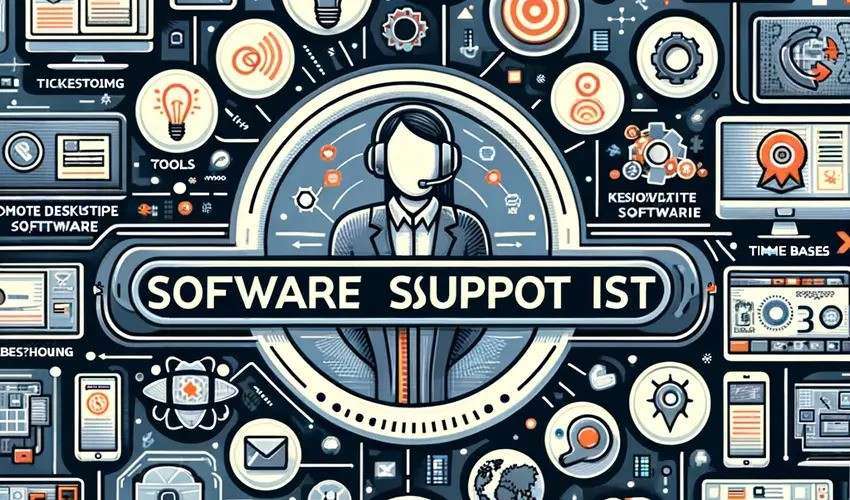Last updated on January 17th, 2026 at 05:59 pm
In today’s technology-driven world, software support specialists play a crucial role in ensuring the smooth operation of software applications. They are the frontline heroes who troubleshoot issues, provide solutions, and maintain user satisfaction. Software support specialists need a comprehensive set of tools and techniques to excel in their roles. This article explores the essential tools and techniques every software support specialist should master.
The Role of a Software Support Specialist
A software support specialist assists users with software-related issues. Their duties include diagnosing and resolving technical problems, providing guidance on software usage, and ensuring software applications run efficiently. The role demands technical knowledge, problem-solving skills, and effective communication.
Essential Tools for Software Support Specialists
1. Ticketing Systems
Ticketing systems are the backbone of support operations, enabling specialists to track, manage, and resolve user issues efficiently.
Popular Ticketing Systems:
- Zendesk: Offers a comprehensive platform for tracking customer inquiries, organizing tickets, and providing analytics.
- Freshdesk: A user-friendly system that supports multi-channel ticket management, including email, chat, and phone.
- Jira Service Desk: Ideal for software development teams, integrating seamlessly with other Jira tools.
2. Remote Desktop Software
Remote desktop software allows support specialists to access and control a user’s computer remotely. Graphon explains how RDS works, showing why this tool is essential for diagnosing and resolving issues that cannot be fixed through verbal instructions alone.
Popular Remote Desktop Tools:
- TeamViewer: Provides secure remote access, file transfer, and collaboration features.
- AnyDesk: Known for its fast connection speeds and low latency.
- Microsoft Remote Desktop: Integrates well with Windows environments, offering robust security and performance.
3. Knowledge Base Systems
A knowledge base system is a repository of information that support specialists can use to find solutions to common issues. It helps quickly resolve user problems by providing ready-made answers and troubleshooting guides.
Popular Knowledge Base Systems:
- Confluence: A collaborative platform that allows teams to create, share, and manage knowledge.
- Helpjuice: Designed specifically for building and maintaining knowledge bases with powerful search capabilities.
- Zoho Desk: Integrates knowledge management with ticketing and customer support.
4. Diagnostic Tools
Diagnostic tools help support specialists identify and analyze software issues. These tools provide detailed information about system performance, software errors, and other technical problems.
Popular Diagnostic Tools:
- Sysinternals Suite: A collection of utilities for diagnosing and troubleshooting Windows systems.
- Wireshark: A network protocol analyzer that helps diagnose network-related issues.
- New Relic: Offers performance monitoring and diagnostics for web applications and servers.
5. Communication Tools
Effective communication is critical for software support specialists. Communication tools facilitate interaction with users and team members, ensuring clear and efficient problem resolution.
Popular Communication Tools:
- Slack: A messaging platform that supports real-time communication and collaboration.
- Microsoft Teams: Integrates chat, video conferencing, and file sharing, ideal for support teams.
- Zoom: Provides video conferencing and screen-sharing capabilities for remote support sessions.
Essential Techniques for Software Support Specialists
1. Troubleshooting
Troubleshooting is diagnosing the root cause of a problem and finding a solution. It involves a systematic approach to identifying, isolating, and resolving issues.
Steps in Troubleshooting:
- Gather Information: Collect detailed information about the problem from the user.
- Identify the Problem: Use diagnostic tools to pinpoint the issue.
- Develop Hypotheses: Formulate possible causes of the problem.
- Test Solutions: Implement and test potential solutions.
- Verify Resolution: Ensure the problem is resolved and the software functions correctly.
2. Effective Communication
Effective communication is essential for understanding user problems and providing clear instructions. Support specialists must be able to explain technical issues in simple terms that users can understand.
Communication Tips:
- Active Listening: Pay close attention to the user’s problem description.
- Clarify and Confirm: Ask questions to clarify details and confirm your understanding.
- Use Simple Language: Avoid technical jargon and explain concepts in plain language.
- Provide Clear Instructions: Give step-by-step guidance to help users resolve issues.
3. Time Management
Time management is crucial for handling multiple support requests efficiently. Support specialists must prioritize tasks and manage their time effectively to ensure timely issue resolution.
Time Management Strategies:
- Prioritize Requests: Focus on critical issues first while addressing less urgent requests as time allows.
- Set Realistic Deadlines: Estimate the time needed for each task and set achievable deadlines.
- Use Automation: Automate repetitive tasks to save time for more complex issues.
- Track Progress: Use ticketing systems to monitor the status of support requests and follow up as needed.
4. Continuous Learning
The field of software support is constantly evolving, with new technologies and software updates emerging regularly. Continuous learning is essential for staying current and maintaining a high level of expertise.
Learning Strategies:
- Attend Training and Workshops: Participate in training sessions and workshops to learn new skills and technologies.
- Read Documentation and Manuals: Stay updated with the latest software documentation and user manuals.
- Join Professional Communities: Engage with professional communities and forums to share knowledge and learn from peers.
- Certifications: Obtain relevant certifications to validate your skills and knowledge.
5. Customer Service Skills
Providing excellent customer service is key to the support specialist’s role. Building a positive relationship with users can enhance their experience and satisfaction.
Customer Service Tips:
- Be Patient and Empathetic: Show understanding and patience when dealing with frustrated users.
- Maintain a Positive Attitude: Approach each interaction with a positive and helpful attitude.
- Follow-up: Check in with users after resolving their issues to ensure they are satisfied.
- Solicit Feedback: Ask for feedback to improve your support services and identify areas for improvement.
Conclusion
The role of a software support specialist is vital in ensuring that software applications run smoothly and users are satisfied. Mastering essential tools and techniques is crucial for success in this role. Support specialists can effectively diagnose and resolve issues by leveraging ticketing systems, remote desktop software, knowledge bases, diagnostic tools, and communication platforms. Additionally, honing skills in troubleshooting, effective communication, time management, continuous learning, and customer service will enable them to provide top-notch support. As technology advances, staying updated with the latest tools and techniques will ensure that software support specialists remain indispensable assets to their organizations.



